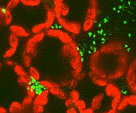Plant Pathology, Department of

Department of Plant Pathology: Faculty Publications
Document Type
Article
Date of this Version
7-1999
Citation
MPMI Vol. 12, No. 7, Jul 1999, pp. 563–574. Publication no. M-1999-0423-01R.
Abstract
The dnaK gene from Pseudomonas syringae pv. glycinea PG4180 was cloned and sequenced. The dnaK coding region was 1,917 bp and contained a putative O32 heat shock promoter 86 bp upstream of the translational start site. grpE, another heat shock gene, was found immediately upstream of the putative dnaK promoter. The predicted amino acid sequence of dnaK showed relatedness to the ATPase and substrate binding domains commonly found in heat shock proteins, as well as the highly conserved signature sequence motifs belonging to the Hsp70 protein family. Furthermore, the PG4180 dnaK gene complemented an Escherichia coli dnaK mutant for growth at temperatures above 37°C, indicating that a fully functional dnaK homologue had been cloned from P. syringae pv. glycinea. All attempts to eliminate dnaK function by insertion mutagenesis failed, possibly because DnaK performs essential functions in P. syringae pv. glycinea. Expression of dnaK in P. syringae pv. glycinea PG4180 was investigated by constructing dnaK::uidA transcriptional fusions; expression of dnaK increased markedly when cells were preincubated at 18°C and then shifted to 35°C. An anti-DnaK monoclonal antibody was used to detect DnaK; in P. syringae pv. glycinea race 4, DnaK levels followed cell density during a 6-h incubation at 26°C. When cells were shifted from 26°C to either 32 or 38°C, DnaK levels increased transiently, and then decreased rapidly. Although the cells continued to grow when incubated at 32°C, growth was not supported at 38°C. Our results indicate that P. syringae pv. glycinea responds to heat shock by producing DnaK, but DnaK does not aid in acclimation to sustained elevated temperatures.


Comments
Copyright © 1999 The American Phytopathological Society. Used by permission.